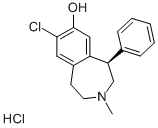125941-87-9
 125941-87-9 結(jié)構(gòu)式
125941-87-9 結(jié)構(gòu)式
基本信息
(R)-8-氯-3-甲基-5-苯基-2,3,4,5-四氫-1H-苯并[D]氮雜卓-7-醇鹽酸鹽
SCH 23390(HCI)
SCH 23390 HYDROCHLORIDE
SCH 23390 hydrochloride NEW
(+)-SCH23390 Hydrochloride, 98.0+ % (HPLC)
R(+)-SCH-23390 HYDROCHLORIDE SELECTIVE D 1 DOPAMINE
SCH23390 HYDROCHLORIDE
SCH-23390 HYDROCHLORIDE
R-(+)-SCH23390 HYDROCHLORIDE
R(+)-7-chloro-8-hydroxy-3-methyl-1-phenyl-2,3,4,5-tetrahydro-1H-3-benzazepine
(5R)-8-Chloro-2,3,4,5-tetrahydro-3-methyl-5-phenyl-1H-3-benzazepin-7-ol hydrochloride
R(+)-7-CHLORO-8-HYDROXY-3-METHYL-1-PHENYL-2,3,4,5-TETRAHYDRO-1H-3-BENZAZEPINE HYDROCHLORIDE
物理化學性質(zhì)
常見問題列表
| Target | Value |
|
D1 dopamine receptor
(Cell-free assay) | 0.2 nM(Ki) |
|
D5 dopamine receptor
(Cell-free assay) | 0.3 nM(Ki) |
|
h5-HT2C receptor
(Cell-free assay) | 9.3 nM(Ki) |
|
GIRK
(Cell-free assay) | 268 nM |
SCH-23390 (1?μM) treatment reverses the inhibitory effects of Isosibiricin on NLRP3 expression and the cleavages of caspase-1 and IL-1β in the LPS-induced BV-2 cells. SCH-23390 could reverse the Isosibiricin-mediated inhibition of the NLRP3/caspase-1 inflammasome pathway.
SCH-23390 can abolish generalized seizures evoked by the chemoconvulsants. SCH-23390 has also been used in studies of other neurological disorders in which the dopamine system has been implicated, such as psychosis and Parkinson's disease. Apart from the study of neurological disorders, SCH-23390 has been extensively used as a tool in the topographical determination of brain D
1
receptors in rodents, nonhuman primates, and humans.
SCH-23390 is a very short-acting compound with an elimination half-life of around 25 min following administration of 0.3 mg/kg i.p. in the rat.
SCH-23390 augments dopamine-induced ductus constriction in CD-1 mouse vessels under newborn O
2
conditions.